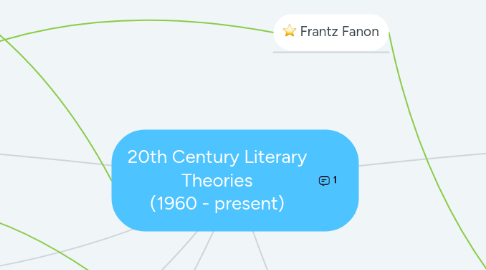20th Century Literary Theories (1960 - present)
저자: Mauro Carassai

1. Feminism
1.1. Any theory that focuses on the relationship of power between gendered subjects endowed with different levels of power: female subjects in a male-dominated society
2. Marxism
2.1. Any theory that, by building on Karl Marx's philosophical ideas (1848), focuses on conflicting social forces within society and on the relationship between: - Structure or Base (the material condition and organization of a society) and - Superstructure (the systems of beliefs, ideas, and values that such a specific societal organization produces or is likely to produce)
3. Structuralism
3.1. Any theory that, by building on Ferdinand de Saussure’s linguistic theory (1916) of the sign as a relationship between the signifier and the signified, tries to see the text as a structure of elements organized into (often binary) oppositions.
4. Psychoanalysis
4.1. Any theory that, by building on Sigmund Freud's ideas (1899), splits the subject into a structural relationship between the rational part (mind) and the irrational human unconscious (subconscious).
5. Tzvetan Todorov Claude Levi-Strauss
6. Raymond Williams Walter Benjamin Terry Eagleton
7. Gayatri Chakravorty Spivak
8. Eve Kosofsky Sedgwick
9. Stuart Hall
10. 20th Century Literary and Cultural Productions
11. Modernism (early 20th Century)
11.1. An intellectual movement characterizing the first half of the 20th century and made of artists, writers, and thinkers who react to the shocks of modernity by creating new and experimental art and literature.
11.2. Artists shared a mistrust for traditional uses of language as able to portray a reality that had become unstable, chaotic, and incomprehensible. Writers - either individually or in groups as Avantgarde movements - begin to experiment with innovative ways of using language in the attempt to create innovative literature.
12. Formalism
12.1. Any theory that focuses primarily on formal qualities of a text (how a text is constructed, organized, and assembled) and conversely downplays content and meaning and any other concern for issues that are outside the text in front of our eyes.
13. Postmodernist Theories (mostly focused on complex Identity Politics)
13.1. Cultural Studies
13.2. Race and Ethnic Studies
13.3. Post-Colonial Theories
13.4. Gender Studies
13.5. LGBT Studeis
13.6. Queer Theories
13.7. Post-Humanist Theories
13.8. Any theory that has a concern for investigating: - the end o the subject as a unified entity - the end of distinction between language and reality
14. Post-Structuralism
14.1. Any theory that, by building on Ferdinand de Saussure’s linguistic theory of the sign (1916), tries to draw attention to the impossibility of any fixed relationship between the signifier and the signified and tries therefore to reveal the inconsistency of any hidden fundamental structure in the text. These theories try to "deconstruct" the text, namely to bring to light the text's disunity, paradoxes, and/or unintended meanings.
15. Michel Foucault Roland Barthes
16. Jean-Francois Lyotard Jean Baudrillard
17. Judith Butler
18. Lauren Berlant Michael Warner
19. Frantz Fanon
20. bell hooks
21. Postmodernism (late 20th Century)
21.1. An intellectual movement that reacts to the shocks of so-called "Post-modernity" made by artists, writers and thinkers who push to the extreme the experimental practices of Modernism.
21.2. Artists, writers, and thinkers shared a concern for showing and arguing about: - the end of grand narratives - the end of center-margin dynamics - the end of the high culture-low culture division


